When Tara Seignuer was volunteering at the Hamilton/Burlington SPCA near her home in Ancaster, Ontario, in September 2017, she met a mother cat and her three kittens who desperately needed someone to foster them. “They all were very sick with respiratory infections,” remembers Tara. “One kitten was ‘normal’ looking, one polydactyl, and then Mira who had folded paws, an upward-turned grin, and her third eyelid showing in both eyes.”
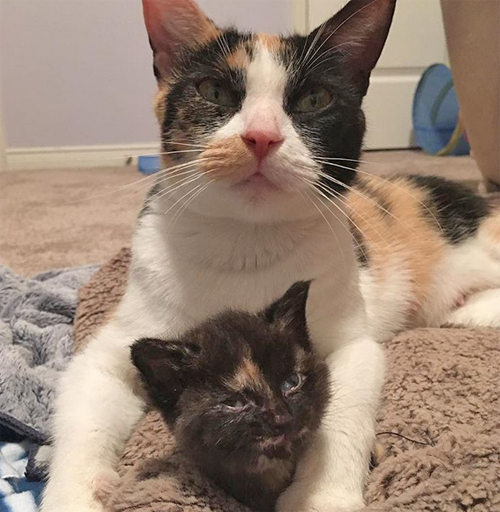
On September 10, 2017, Tara brought three members of the feline family home — “The ‘normal’ one didn’t come as she had passed the morning before I got there,” says Tara — determined to give the pair of sickly 4-week-old kittens the best care possible. “Because of the infection, they couldn’t eat from their mom and had to be syringe-fed,” explains Tara.
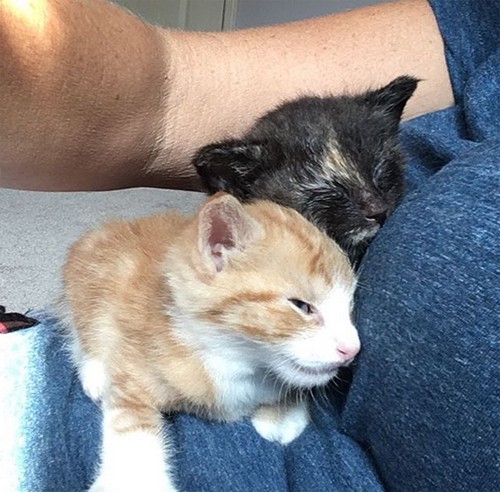
However, despite Tara’s heroic efforts, one of the kittens passed away within a matter of days, leaving just the mother cat and Mira, a tiny tortoiseshell cat. While Mira was alive, she was still incredibly ill, and for several weeks, she struggled to fight the virulent respiratory infection.
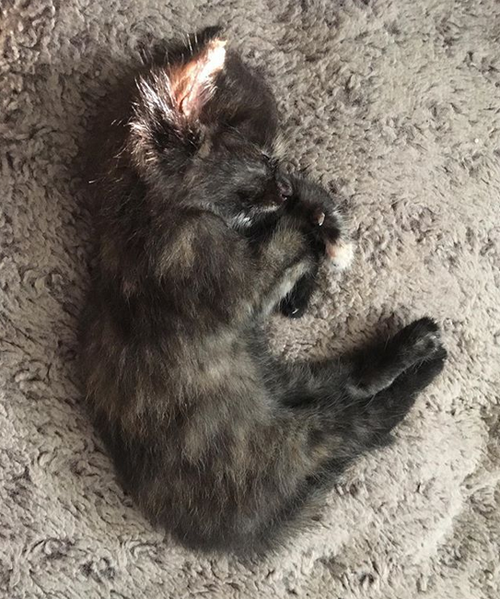
“I had to constantly give her steam baths and showers, and wipe her nose clean to keep her breathing,” explains Tara. “I stayed with her most days and every night, with her sleeping on my chest. A couple times she stopped breathing but I got her back!”
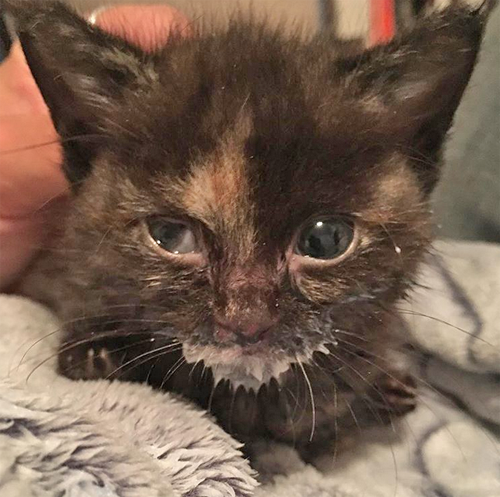
Tara continued this rigorous routine for four months, barely sleeping, as she helped the frail kitten battle constipation and then diarrhea, until Christmas 2017 when Mira was finally given a clean bill of health.
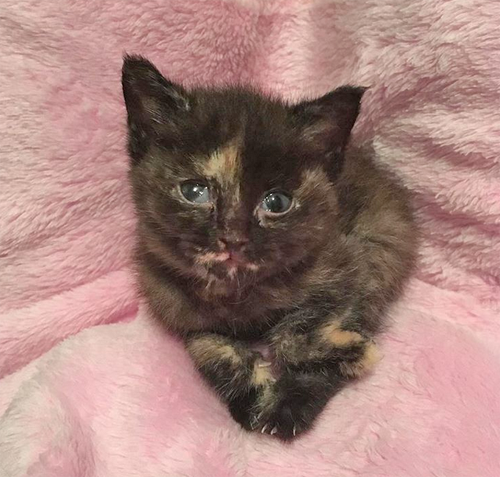
However, once Mira was free from illness, she began trying to explore like a typical young feline, and it became apparent that she was unable to move like the average kitten and her front legs appeared to be unusually short and twisted.
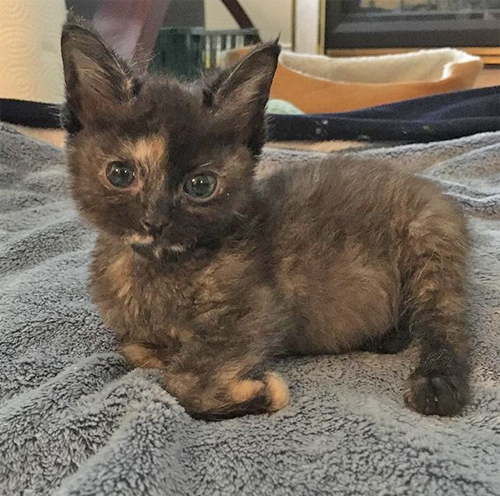
“She would wobble and fall,” says Tara, “and even with stretching her paws — which the vet advised — they never straightened.” Eventually, Mira was diagnosed with cerebellar hypoplasia (CH) and radial hypoplasia (RH), two congenital conditions that are commonly found in homeless cat populations.
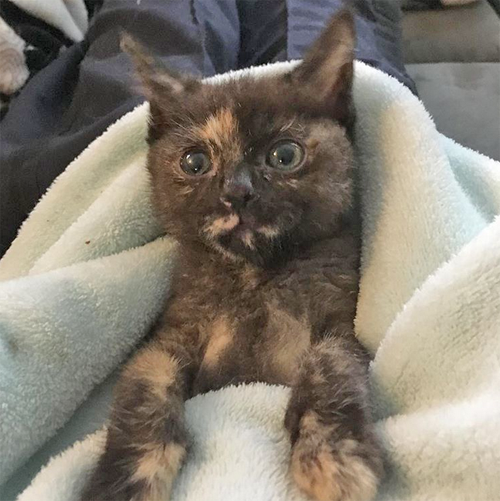
“CH is a non-progressive, non-contagious neurological condition that results in walking and balance problems,” explains Tara. “It occurs when the cerebellum — the part that controls fine motor skills and coordination — is underdeveloped at birth.” Cerebellar hypoplasia occurs in utero when unborn kittens are exposed via their pregnant mothers to toxins or viruses, such as panleukopenia.
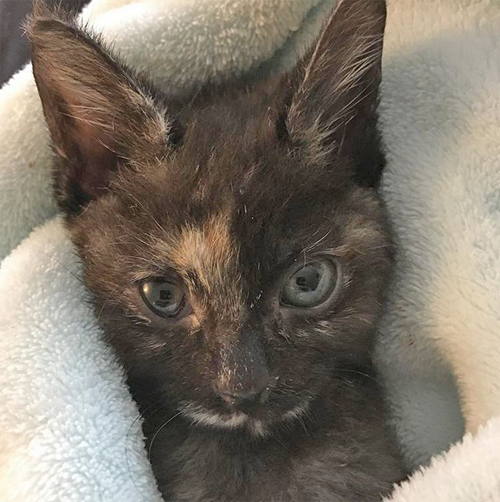
“RH is a disabling condition where the forelegs are abnormally short and twisted,” says Tara. “Cats with RH tend to sit up like rabbits or kangaroos and hop around like rabbits.” Radial hypoplasia is the result of a genetic mutation, and this condition is actually a form of polydactyly.
While no one knows what life was like before Mira and her family were taken to the HBSPCA as strays, Tara believes her mother — who was adopted in late 2017 — was malnourished or sick when she was pregnant, and either she or her kittens’ father had the gene for radial hypoplasia.
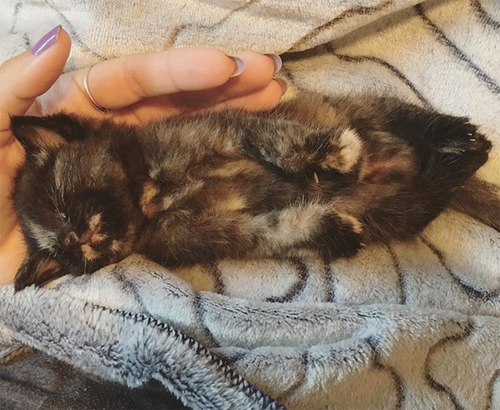
“I think the biggest misconceptions people have about these conditions is that they are curable,” says Tara, but neither radial hypoplasia or cerebellar hypoplasia can be cured, although cats with these conditions can have happy and healthy lives. After months of fighting for her life, Mira was finally ready to be spayed, so Tara dropped her off for the procedure on February 2, 2018. “When I picked her up that afternoon they handed me the adoption certificate already filled out and told me she was mine,” says Tara. “[It was the] happiest day! I actually cried.”
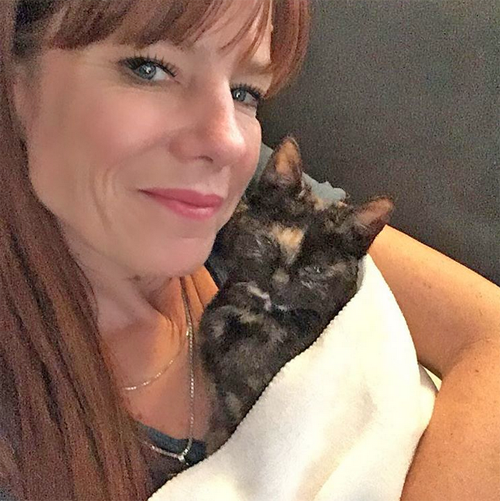
Today, Mira — who will celebrate her first birthday on August 13, 2018 — is doing incredibly well, although her mom admits there have been a few challenges, especially when it comes to this gorgeous girl’s limited mobility. “She can’t walk more than a few steps and usually ends up falling backwards,” explains Tara. “Because of this — and for her safety — I’ve set up a playpen for when I’m not home, which also has puppy pads for her to use the washroom.”
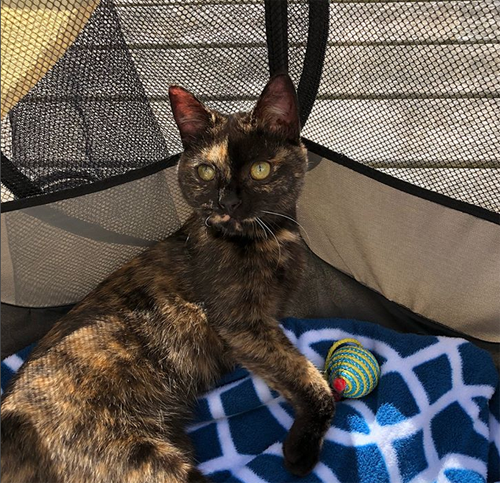
Fortunately, Mira doesn’t have trouble using puppy pads instead of a litter box, and because she’s developed a set of unique noises to communicate her wants and needs to her mom, Tara can’t even remember the last time this adorable tortie had an accident.
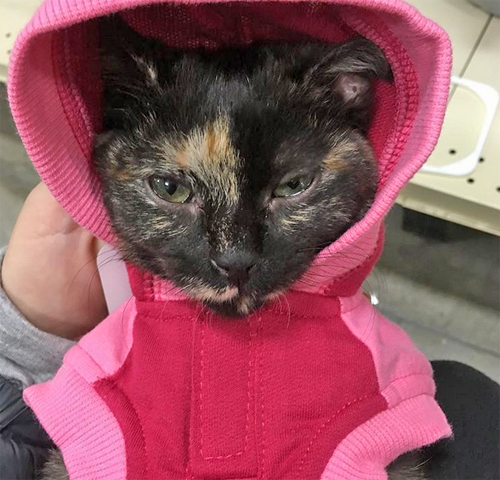
Aside from these special accommodations, Mira is a pretty typical young cat who adores playing in her tunnels. “Those are by far her favourite toys,” says Tara. “She’ll launch herself from across the room to get inside!”
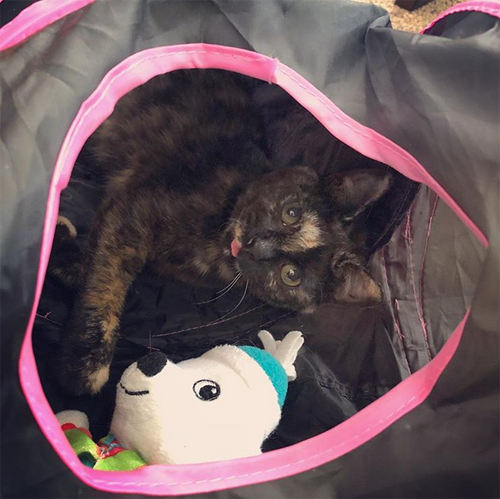
This sassy feline also enjoys watching Tara’s dog and three other cats, although none of them are that eager to cuddle up with Mira. “They never get too close as her jerky movements seem to scare them,” explains Tara. “My dog was very protective of her at first and would sit right beside her. That changed when she started being an ankle biter!”
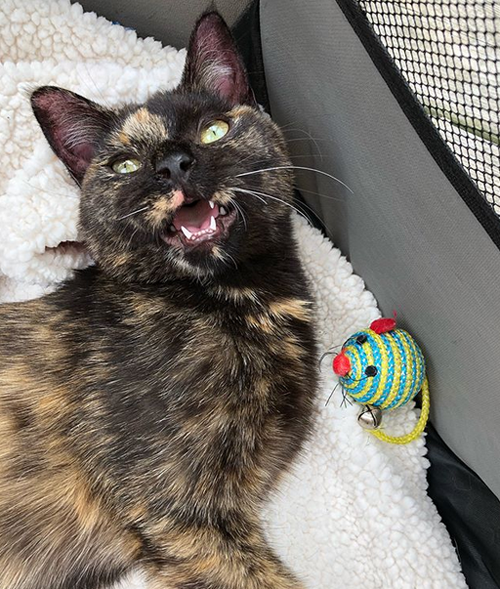
While none of the other animals in her household seem to appreciate Mira’s unique ways of moving and showing affection, this feisty little girl doesn’t mind one bit because she’d rather be with Tara anyways. “She comes everywhere with me,” says Tara. “She even came with me to Costa Rica for two weeks for vacation! She loved the beach and ocean and hanging with me in the pool.”
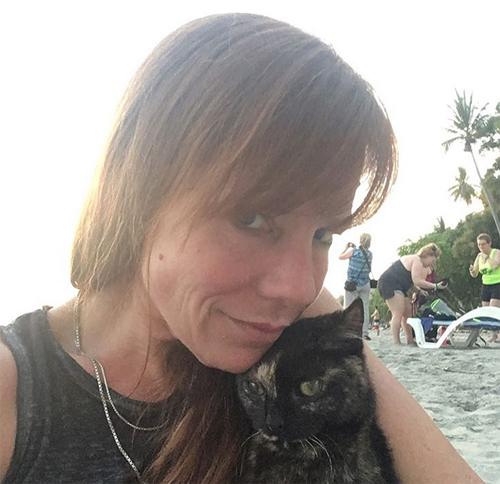
Without a doubt, Mira and her mom have an amazing bond, and Tara hopes more people will consider adopting cats with conditions like radial hypolasia and cerebellar hypoplasia. “Special needs cats have so much love to give, and they maybe show it more than ‘normal’ cats do,” says Tara. “I’ve seen with Mira — when she’s accomplished something and I get excited for her — her eyes brighten and you can see she’s happy and proud.”
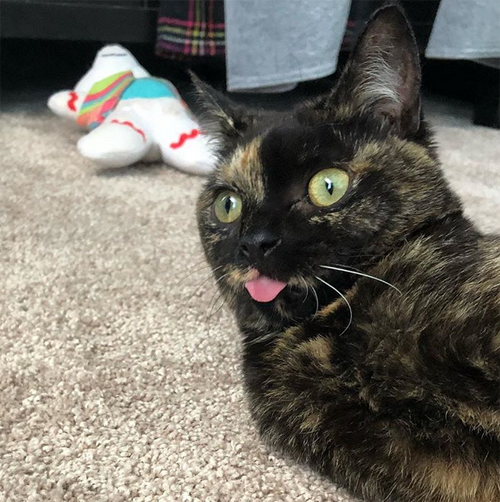
While Mira has overcome many obstacles in her life, perhaps her biggest accomplishment is surviving the respiratory infection that claimed the lives of two of her siblings. “Even though they told me she probably wouldn’t survive, I somehow just knew she would,” says Tara. “I knew there would be challenges, but everything she did was so rewarding. Seeing all of her firsts — first step, purr, meow, eating by herself — and lucky I caught them all on video!”
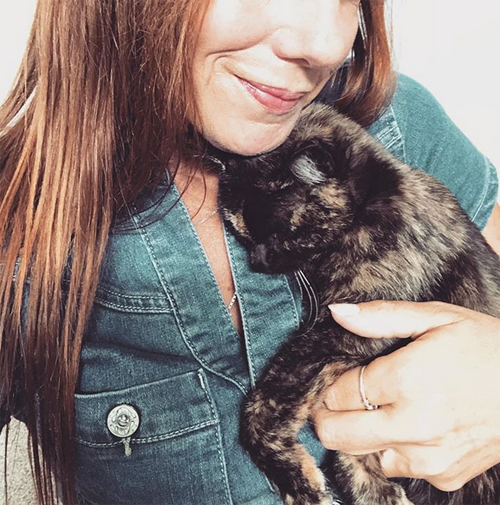
From the moment they met, Tara knew Mira was special, which is why she gave this spitfire a name that captured her phenomenal spirit. “When I first got Mira I knew she was a fighter, a little warrior princess really,” says Tara. “I wanted a strong name for her but ultimately kept calling her my Little Miss Miracle as she overcame so much.”
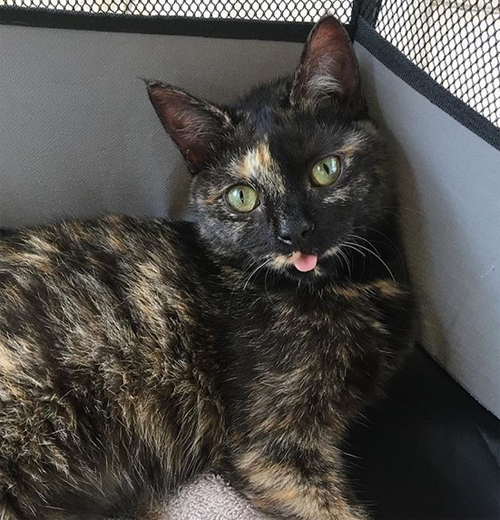
Undoubtedly, Mira inspires her mom to fight and to never give up, even when a challenge seems insurmountable, but this little girl also has an incredibly loving and sweet side that reminds Tara how important it is to be both strong and tender. “She sleeps in bed with me cuddling every night and I can literally feel her love,” says Tara. “Sometimes when she’s sitting in my lap just hanging out she’ll look up at me and just stare, like she’s looking into my soul and telling me she loves me. I can’t imagine my life without her.”
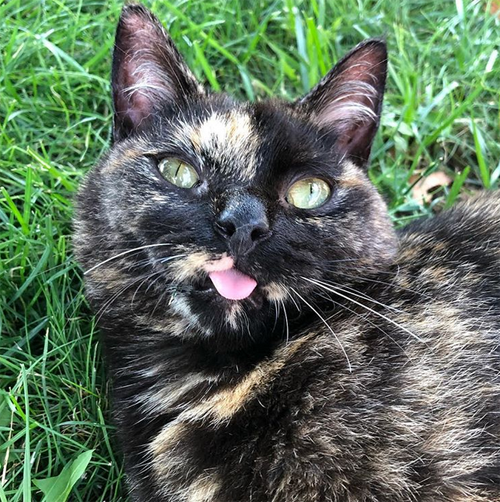
To learn more about this stunning kitten, you can follow Mira on Instagram.



